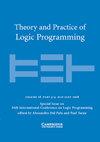概率逻辑程序中的概率优化
IF 1.1
2区 数学
Q3 COMPUTER SCIENCE, SOFTWARE ENGINEERING
引用次数: 0
摘要
摘要概率逻辑编程是一种有效的编码形式,其特征是不确定性。这些问题中的一些可能需要在随机变量的概率分布之间受到约束的概率值的优化。在这里,我们介绍了一类新的概率逻辑程序,即概率可优化逻辑程序,并提供了一种有效的算法来找到随机变量概率的最佳分配,从而满足一组约束并优化目标函数。本文章由计算机程序翻译,如有差异,请以英文原文为准。
Optimizing Probabilities in Probabilistic Logic Programs
Abstract Probabilistic logic programming is an effective formalism for encoding problems characterized by uncertainty. Some of these problems may require the optimization of probability values subject to constraints among probability distributions of random variables. Here, we introduce a new class of probabilistic logic programs, namely probabilistic optimizable logic programs, and we provide an effective algorithm to find the best assignment to probabilities of random variables, such that a set of constraints is satisfied and an objective function is optimized.
求助全文
通过发布文献求助,成功后即可免费获取论文全文。
去求助
来源期刊

Theory and Practice of Logic Programming
工程技术-计算机:理论方法
CiteScore
4.50
自引率
21.40%
发文量
40
审稿时长
>12 weeks
期刊介绍:
Theory and Practice of Logic Programming emphasises both the theory and practice of logic programming. Logic programming applies to all areas of artificial intelligence and computer science and is fundamental to them. Among the topics covered are AI applications that use logic programming, logic programming methodologies, specification, analysis and verification of systems, inductive logic programming, multi-relational data mining, natural language processing, knowledge representation, non-monotonic reasoning, semantic web reasoning, databases, implementations and architectures and constraint logic programming.
 求助内容:
求助内容: 应助结果提醒方式:
应助结果提醒方式:


